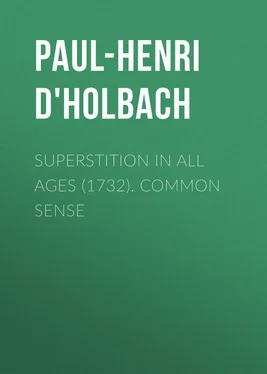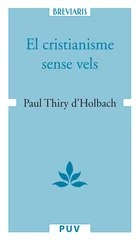Paul-Henri Holbach - Superstition In All Ages (1732). Common Sense
Здесь есть возможность читать онлайн «Paul-Henri Holbach - Superstition In All Ages (1732). Common Sense» — ознакомительный отрывок электронной книги совершенно бесплатно, а после прочтения отрывка купить полную версию. В некоторых случаях можно слушать аудио, скачать через торрент в формате fb2 и присутствует краткое содержание. Жанр: Философия, literature_18, foreign_prose, на французском языке. Описание произведения, (предисловие) а так же отзывы посетителей доступны на портале библиотеки ЛибКат.
- Название:Superstition In All Ages (1732). Common Sense
- Автор:
- Жанр:
- Год:неизвестен
- ISBN:нет данных
- Рейтинг книги:3 / 5. Голосов: 1
-
Избранное:Добавить в избранное
- Отзывы:
-
Ваша оценка:
- 60
- 1
- 2
- 3
- 4
- 5
Superstition In All Ages (1732). Common Sense: краткое содержание, описание и аннотация
Предлагаем к чтению аннотацию, описание, краткое содержание или предисловие (зависит от того, что написал сам автор книги «Superstition In All Ages (1732). Common Sense»). Если вы не нашли необходимую информацию о книге — напишите в комментариях, мы постараемся отыскать её.
Superstition In All Ages (1732). Common Sense — читать онлайн ознакомительный отрывок
Ниже представлен текст книги, разбитый по страницам. Система сохранения места последней прочитанной страницы, позволяет с удобством читать онлайн бесплатно книгу «Superstition In All Ages (1732). Common Sense», без необходимости каждый раз заново искать на чём Вы остановились. Поставьте закладку, и сможете в любой момент перейти на страницу, на которой закончили чтение.
Интервал:
Закладка:
II. – WHAT IS THEOLOGY?
There is a science which has for its object only incomprehensible things. Unlike all others, it occupies itself but with things unseen. Hobbes calls it "the kingdom of darkness." In this land all obey laws opposed to those which men acknowledge in the world they inhabit. In this marvelous region light is but darkness, evidence becomes doubtful or false, the impossible becomes credible, reason is an unfaithful guide, and common sense changed into delirium. This science is named Theology, and this Theology is a continual insult to human reason.
III
By frequent repetition of if, but, and perhaps, we succeed in forming an imperfect and broken system which perplexes men's minds to the extent of making them forget the clearest notions, and to render uncertain the most palpable truths. By the aid of this systematic nonsense, all nature has become an inexplicable enigma for man; the visible world has disappeared to give place to invisible regions; reason is obliged to give place to imagination, which can lead us only to the land of chimeras which she herself has invented.
IV. – MAN BORN NEITHER RELIGIOUS NOR DEISTICAL
All religious principles are founded upon the idea of a God, but it is impossible for men to have true ideas of a being who does not act upon any one of their senses. All our ideas are but pictures of objects which strike us. What can the idea of God represent to us when it is evidently an idea without an object? Is not such an idea as impossible as an effect without a cause? An idea without a prototype, is it anything but a chimera? Some theologians, however, assure us that the idea of God is innate, or that men have this idea from the time of their birth. Every principle is a judgment; all judgment is the effect of experience; experience is not acquired but by the exercise of the senses: from which it follows that religious principles are drawn from nothing, and are not innate.
V. – IT IS NOT NECESSARY TO BELIEVE IN A GOD, AND THE MOST REASONABLE THING IS NOT TO THINK OF HIM
No religious system can be founded otherwise than upon the nature of God and of men, and upon the relations they bear to each other. But, in order to judge of the reality of these relations, we must have some idea of the Divine nature. But everybody tells us that the essence of God is incomprehensible to man; at the same time they do not hesitate to assign attributes to this incomprehensible God, and assure us that man can not dispense with a knowledge of this God so impossible to conceive of. The most important thing for men is that which is the most impossible for them to comprehend. If God is incomprehensible to man, it would seem rational never to think of Him at all; but religion concludes that man is criminal if he ceases for a moment to revere Him.
VI. – RELIGION IS FOUNDED UPON CREDULITY
We are told that Divine qualities are not of a nature to be grasped by limited minds. The natural consequence of this principle ought to be that the Divine qualities are not made to employ limited minds; but religion assures us that limited minds should never lose sight of this inconceivable being, whose qualities can not be grasped by them: from which we see that religion is the art of occupying limited minds with that which is impossible for them to comprehend.
VII. – EVERY RELIGION IS AN ABSURDITY
Religion unites man with God or puts them in communication; but do you say that God is infinite? If God is infinite, no finite being can have communication or any relation with Him. Where there are no relations, there can be no union, no correspondence, no duties. If there are no duties between man and his God, there exists no religion for man. Thus by saying that God is infinite, you annihilate, from that moment, all religion for man, who is a finite being. The idea of infinity is for us in idea without model, without prototype, without object.
VIII. – THE NOTION OF GOD IS IMPOSSIBLE
If God is an infinite being, there can be neither in the actual world or in another any proportion between man and his God; thus the idea of God will never enter the human mind. In the supposition of a life where men will be more enlightened than in this one, the infinity of God will always place such a distance between his idea and the limited mind of man, that he will not be able to conceive of God any more in a future life than in the present. Hence, it evidently follows that the idea of God will not be better suited to man in the other life than in the present. God is not made for man; it follows also that intelligences superior to man – such as angels, archangels, seraphims, and saints – can have no more complete notions of God than has man, who does not understand anything about Him here below.
IX. – ORIGIN OF SUPERSTITION
How is it that we have succeeded in persuading reasonable beings that the thing most impossible to understand was the most essential for them. It is because they were greatly frightened; it is because when men are kept in fear they cease to reason; it is because they have been expressly enjoined to distrust their reason. When the brain is troubled, we believe everything and examine nothing.
X. – ORIGIN OF ALL RELIGION
Ignorance and fear are the two pivots of all religion. The uncertainty attending man's relation to his God is precisely the motive which attaches him to his religion. Man is afraid when in darkness – physical or moral. His fear is habitual to him and becomes a necessity; he would believe that he lacked something if he had nothing to fear.
XI. – IN THE NAME OF RELIGION CHARLATANS TAKE ADVANTAGE OF THE WEAKNESS OF MEN
He who from his childhood has had a habit of trembling every time he heard certain words, needs these words, and needs to tremble. In this way he is more disposed to listen to the one who encourages his fears than to the one who would dispel his fears. The superstitious man wants to be afraid; his imagination demands it. It seems that he fears nothing more than having no object to fear. Men are imaginary patients, whom interested charlatans take care to encourage in their weakness, in order to have a market for their remedies. Physicians who order a great number of remedies are more listened to than those who recommend a good regimen, and who leave nature to act.
XII. – RELIGION ENTICES IGNORANCE BY THE AID OF THE MARVELOUS
If religion was clear, it would have fewer attractions for the ignorant. They need obscurity, mysteries, fables, miracles, incredible things, which keep their brains perpetually at work. Romances, idle stories, tales of ghosts and witches, have more charms for the vulgar than true narrations.
XIII. – CONTINUATION
In the matter of religion, men are but overgrown children. The more absurd a religion is, and the fuller of marvels, the more power it exerts; the devotee thinks himself obliged to place no limits to his credulity; the more inconceivable things are, the more divine they appear to him; the more incredible they are, the more merit he gives himself for believing them.
XIV. – THERE WOULD NEVER HAVE BEEN ANY RELIGION IF THERE HAD NEVER BEEN ANY DARK AND BARBAROUS AGES
The origin of religious opinions dates, as a general thing, from the time when savage nations were yet in a state of infancy. It was to coarse, ignorant, and stupid men that the founders of religion addressed themselves in all ages, in order to present them with Gods, ceremonies, histories of fabulous Divinities, marvelous and terrible fables. These chimeras, adopted without examination by the fathers, have been transmitted with more or less changes to their polished children, who often do not reason more than their fathers.
Читать дальшеИнтервал:
Закладка:
Похожие книги на «Superstition In All Ages (1732). Common Sense»
Представляем Вашему вниманию похожие книги на «Superstition In All Ages (1732). Common Sense» списком для выбора. Мы отобрали схожую по названию и смыслу литературу в надежде предоставить читателям больше вариантов отыскать новые, интересные, ещё непрочитанные произведения.
Обсуждение, отзывы о книге «Superstition In All Ages (1732). Common Sense» и просто собственные мнения читателей. Оставьте ваши комментарии, напишите, что Вы думаете о произведении, его смысле или главных героях. Укажите что конкретно понравилось, а что нет, и почему Вы так считаете.












